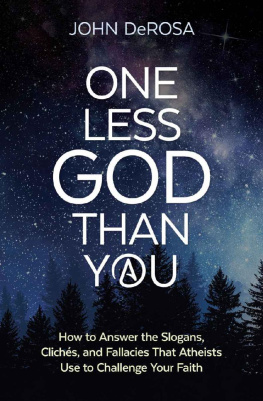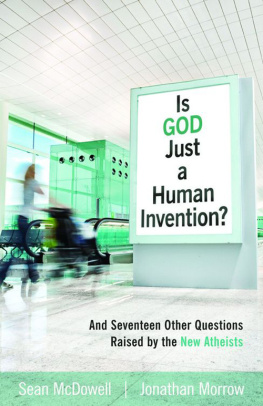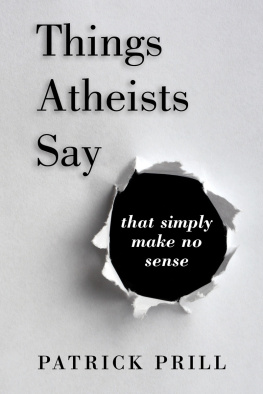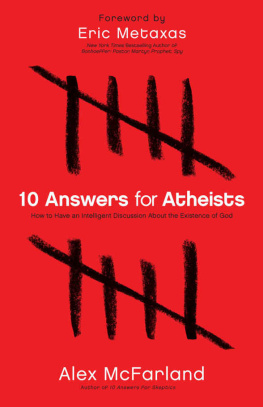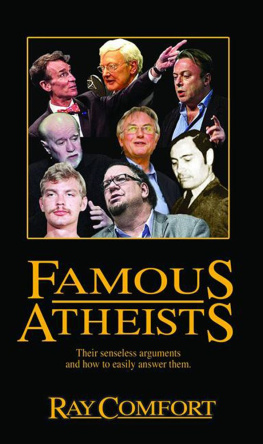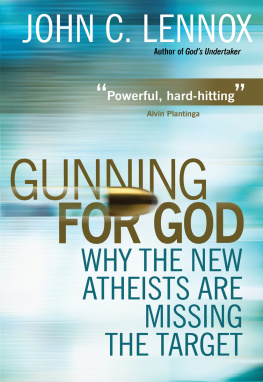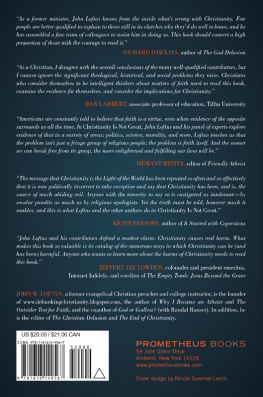2020 John DeRosa
All rights reserved. Except for quotations, no part of this book may be reproduced or transmitted in any form or by any means, electronic or mechanical, including photocopying, recording, uploading to the internet, or by any information storage and retrieval system without written permission from the publisher.
Published by Catholic Answers, Inc.
2020 Gillespie Way
El Cajon, California 92020
1-888-291-8000 orders
619-387-0042 fax
catholic.com
Printed in the United States of America
Cover and interior by Russell Graphic Design
978-1-68357-165-0 978-1-68357-166-7 Kindle 978-1-68357-167-4 ePub
Id like to thank Catholic Answers Press for publishing this book. I continue to learn so much about the Faith from people at Catholic Answers. Also, Id like to thank Gary Michuta for introducing me to CA Press and urging me to publish the book.
Special gratitude goes to my wonderful wife Christine. I thank her for the constant love and support as she encouraged me during many afternoons working on the manuscript. Finally, Id like to thank Todd Aglialoro and Jeffrey Rubin for their work in the editing process; they shaped this project into a more coherent and useful whole.
CONTENTS
POPULAR SLOGANS
SERIOUS SLOGANS
SLOGANS ABOUT FAITH & EVIDENCE
MISCELLANEOUS SLOGANS
Introduction
You probably think Santa Claus is real. Or that the Earth is flat. Maybe your ancestors thought Thor caused lightning and thunderstorms. Or that praying to a statue would bring healing. We have moved past that. Now, we live in an age of science. If you still believe in God, you must be a superstitious ignoramus.
This common attitude of internet atheists has led many away from faith. Believers must share the blame. A lot of Catholic Christians cannot give reasons for the hope that is within them. They have not learned to support their worldview with reasons and evidence. Rather, theyve been told to just have faith and not ask too many questions.
Because of this, atheism has been successful in winning converts. Many skeptical slogans have led others to doubt their religious beliefs. But although the slogans have surface-level plausibility, I will show that they do not stand up to scrutiny. Some slogans are more serious than others, and behind several of them are deep, philosophical objections (such as the problem of evil). Nonetheless, all of them can be answered using the intellectual resources from the Christian tradition and contemporary philosophy.
My goal in this book is to equip you with the knowledge and tactics needed to answer the most popular atheist slogans. If you study this material, you will be more than ready to respond the next time you hear skeptical one-liners in conversation.
Atheists Are Getting Them Young
Recently, I was at a retreat where the priest relayed that many elementary students are self-proclaimed atheists by the fourth grade. On the podcast Every Knee Shall Bow , the hosts report the rise of atheism among middle and high school students.
One of the hosts, Dave VanVickle, explains that in one case it was a high school science teacher turning students into atheists. Parents came to VanVickle for damage control, asking him to speak with their now-atheist sons and daughters.
In the 1994 anthology God and the Philosophers , Michael J. Murray tells what happened during his sophomore year as a philosophy student. Murrays friend had been bothered by a philosophy professor who had been leaning on the theists. In fact, that professor admitted to Murray during office hours, One of my goals is that all of my students leave my class as atheists. This episode occurred in the 1980s.
Almost forty years later, the situation is worse. We need to face the reality of atheism on the rise. Particularly, we need to know how to dialogue about our faith intelligently . If we dont, then more of our children will be swept away by the atheist slogans of the age.
Five Foundational Principles
Interacting with atheists can be draining. Not every conversation will go well, especially when you start out. But if you follow these five principles, you can drastically improve your mindset and your conversations.
Heres the first principle: pray every day. Develop a daily prayer routine. Decide on a specific segment of time as your personal prayer baseline. It could be ten or fifteen minutes. Currently, I aim for twenty minutes, but I dont always hit my mark. But I want to grow in my prayer life. Some spiritual masters recommend thirty minutes per day with the goal of building up to a holy hour every day. The Catechism of the Catholic Church sets out the importance of a prayer schedule and routine:
The choice of the time and duration of the prayer arises from a determined will, revealing the secrets of the heart. One does not undertake contemplative prayer only when one has the time: one makes time for the Lord, with the firm determination not to give up, no matter what trials and dryness one may encounter. One cannot always meditate, but one can always enter into inner prayer, independently of the conditions of health, work, or emotional state. The heart is the place of this quest and encounter, in poverty and in faith (CCC 2710).
This principle drives us to develop a deeper relationship with the Lord. This will allow you to discern more effectively what a person needs to hear in conversation. Also, it will prevent you from getting burned out or discouraged when dialogue goes bad. You dont need me to tell you that conversations about religion often get heated. Daily prayer will help us to keep our cool during such encounters. Even if the other side resorts to insults and mockery, that is not the Christian way. As a result, you will not find mockery in the pages of this book. My aim has nothing to do with making fun of the New Atheists. Rather, I want to equip you to handle skeptics charitably.
As a baptized Christian, you have the indwelling Holy Spirit. Conversing with God every day deepens this reality, allowing the Holy Spirit to work through you. Daily prayer will help you know what to say and how to say it. So thats the first tip: pray every day.
Heres the second principle: whenever possible, start by asking questions rather than making statements. Asking questions places you in the drivers seat of the conversation. You can steer it where you want it to go. You can make sure it stays on topic.
Questions provide an avenue to learn what the other person actually thinks, providing you with valuable information for deciding how to help your conversation partner.
Greg Koukl points to three helpful questions that can be asked in almost any context:
What do you mean by that?
How did you come to that conclusion?
Have you ever considered... ?
Questions are powerful. And theyre fun! When you dialogue with an atheist, its much less stressful to ask questions than to try to give a detailed argument from memory.
The more you find out about their beliefs, the better position you are in to help defuse the slogans. One central aim in this book is to provide you with specific questions you can ask when you hear people raise different slogans. Also, once you see the power of asking questions, you can start to develop your own questions to use in apologetic/evangelistic contexts.
Heres the third principle: Dont let people get away with vague, wishy-washy criticisms. Sometimes people make vague objections they think are enough to win the day. Consider the following:

